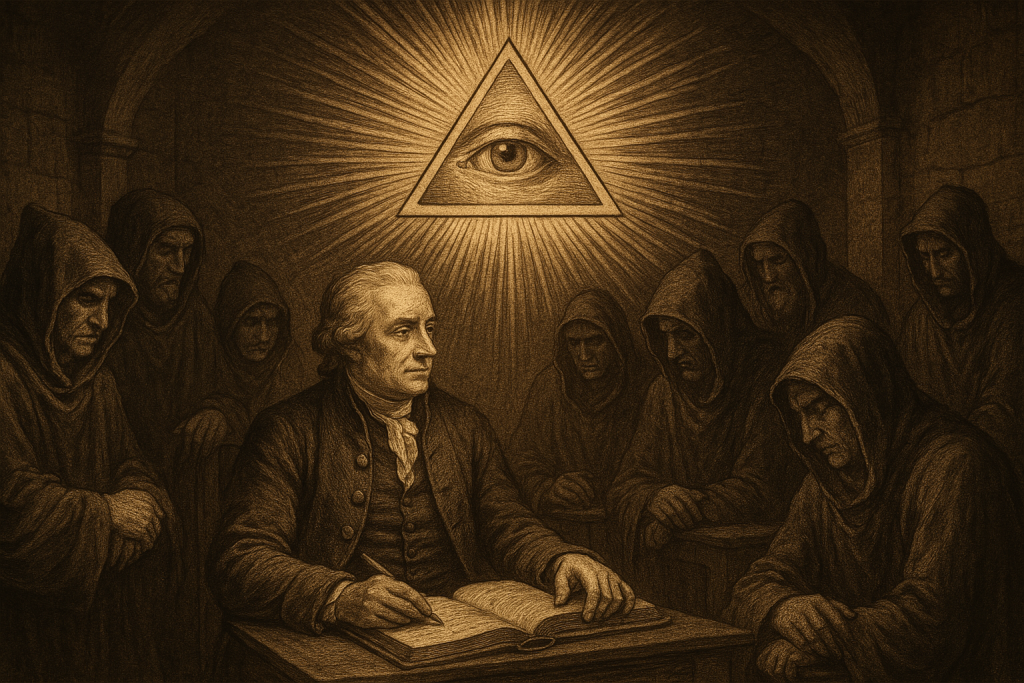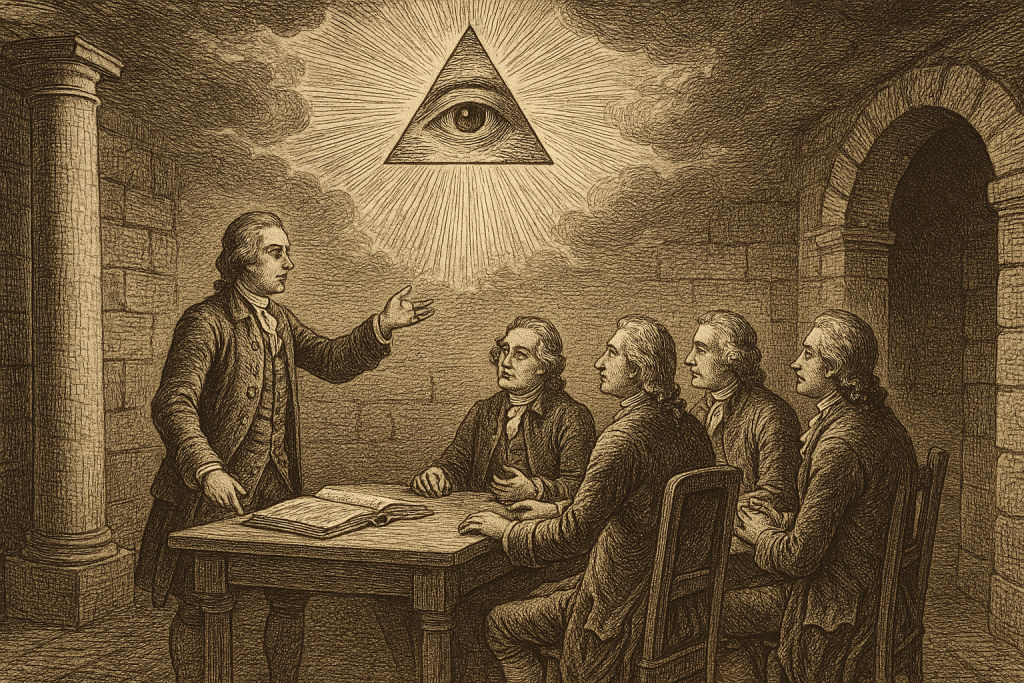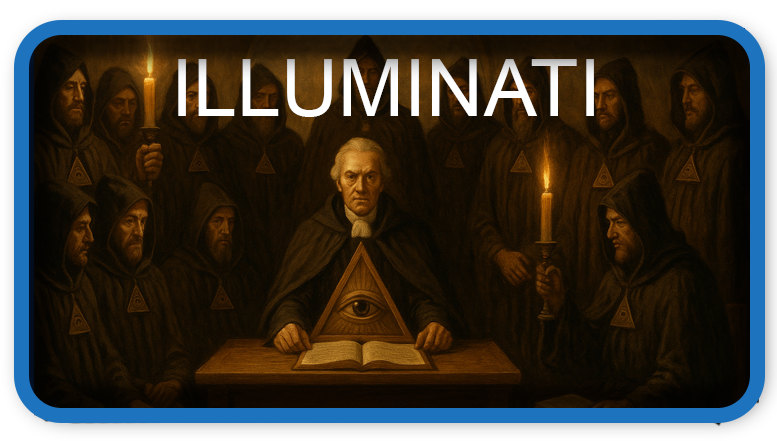⏲️ Estimated reading time: 5 min
The Illuminati, founded by Adam Weishaupt in 1776, began as an Enlightenment-era intellectual movement. Though it was short-lived, the secret society became the subject of countless conspiracy theories, capturing imaginations for centuries.
The Illuminati: The World’s Most Mysterious Secret Society
The Illuminati is perhaps the most famous secret society in history, known for its perceived influence, conspiracy theories, and association with world events. Despite the many myths that surround it, the origin of the Illuminati traces back to Johann Adam Weishaupt, a German philosopher and professor, who founded the group in 1776. The Illuminati, at its core, was an intellectual movement aimed at promoting Enlightenment ideals, but over time, it became the subject of countless theories and speculations. Understanding Weishaupt and the context in which he created the Illuminati can shed light on the true purpose behind this mysterious society.
Johann Adam Weishaupt: The Man Behind the Illuminati
Johann Adam Weishaupt was born on February 6, 1748, in Ingolstadt, Bavaria (then part of the Holy Roman Empire). His early life was influenced by the Enlightenment, an intellectual movement that championed reason, science, and the challenge of traditional authority, particularly the Church and monarchies. Orphaned at a young age, Weishaupt was raised by a Jesuit priest. Ironically, despite this strong religious upbringing, he would later criticize and oppose the Church’s influence.
Weishaupt pursued law at the University of Ingolstadt, earning a doctorate and eventually becoming a professor of canon law. However, it was his philosophical interests, shaped by thinkers like Voltaire, Rousseau, and Locke, that defined his legacy. He believed that rational thought, not religious dogma, should guide human behavior and society.
The Birth of the Illuminati in 1776
In a time when the Enlightenment was reshaping Europe, Weishaupt saw the need for a structured movement to challenge tyranny. On May 1, 1776, he founded the “Order of the Illuminati.” The group’s mission was clear: to advocate for Enlightenment values rationality, secularism, and individual liberty while secretly working to undermine oppressive regimes and dogmatic religious institutions.
Initially, consisted of just five members. However, Weishaupt was strategic. He designed a system of secretive hierarchy and rituals to inspire loyalty and keep operations covert. Within a few years, the group expanded rapidly across Bavaria and beyond, reaching an estimated 2,000 members, including intellectuals, politicians, and nobles.
Illuminati Ideology and Structure
The Illuminati’s beliefs mirrored Enlightenment principles. Core ideals included:
- Freedom of thought: Encouraging questioning of traditional beliefs.
- Secular governance: Opposing the Church’s control over state matters.
- Equality and meritocracy: Promoting individuals based on ability, not nobility or wealth.
- Universal education: Believing knowledge should be accessible to all.
To preserve secrecy and integrity, the society was organized into levels:
- Novice: New recruits, taught Enlightenment fundamentals.
- Minerval: Educated members trained in subversive strategies.
- Illuminated Minerval: Trusted leaders with deeper knowledge of the group’s ambitions.
At the top was Weishaupt, under the pseudonym “Spartacus,” managing the network like a covert political engine.
The Fall of the Illuminati
As the Illuminati grew, it drew the attention of conservative and religious authorities. The organization’s secrecy and anti-monarchist agenda made it a target. In 1785, the Bavarian government, under Prince-Elector Karl Theodor, outlawed the Illuminati and all secret societies.
Members were arrested and their writings confiscated. Though Weishaupt escaped into exile in Gotha, the order was effectively dismantled. Officially, the Illuminati ceased to exist within a decade of its founding.

Myths, Legends, and Conspiracy Theories
Despite its short existence, the Illuminati lived on through rumor and speculation. In the late 18th and early 19th centuries, authors like John Robison and Augustin Barruel accused the Illuminati of orchestrating major global events such as the French Revolution.
In modern times, became synonymous with secret world domination. Popular theories suggest they control global banking, manipulate political outcomes, and even influence entertainment. Symbols like the “All-Seeing Eye” on the U.S. dollar are often cited as proof of influence though this is more rooted in Masonic symbolism than the original Illuminati.
Books like Angels and Demons by Dan Brown and numerous pop culture references only deepened the intrigue.

The Real Legacy
Historians largely dismiss the modern conspiracy theories. The consensus is that the Illuminati was an Enlightenment-inspired reform movement, not a sinister cabal.
Still, the appeal of the Illuminati endures because it taps into a deeper human curiosity: the allure of secret power, hidden truths, and rebellion against control. The combination of secrecy, ambition, and philosophy created a story too compelling to disappear.
Final Thoughts: Enlightenment or Manipulation?
Was the Illuminati a noble effort to spread reason, or a dangerous experiment in manipulation? Perhaps it was both. What is clear is that Johann Adam Weishaupt envisioned a new world one ruled not by superstition and hereditary power, but by intellect and equality.
While the original Illuminati faded quickly, the idea of challenging authority and seeking hidden truths remains powerful. In that sense, the spirit of the Illuminati is very much alive.
📩 Do you have questions or suggestions? Leave a comment or contact us!
📌 Tags: Illuminati, Adam Weishaupt, Secret Societies, Enlightenment, Conspiracy Theories, History of Illuminati, Bavarian Illuminati, Freemasonry, Hidden Power, Rationalism
📣 Hashtags: #Illuminati #SecretSociety #AdamWeishaupt #ConspiracyTheories #Enlightenment #HiddenHistory #WorldControl #BavarianIlluminati #Freemasons #RationalThought
Only logged-in users can submit reports.
Discover more from HelpZone
Subscribe to get the latest posts sent to your email.

